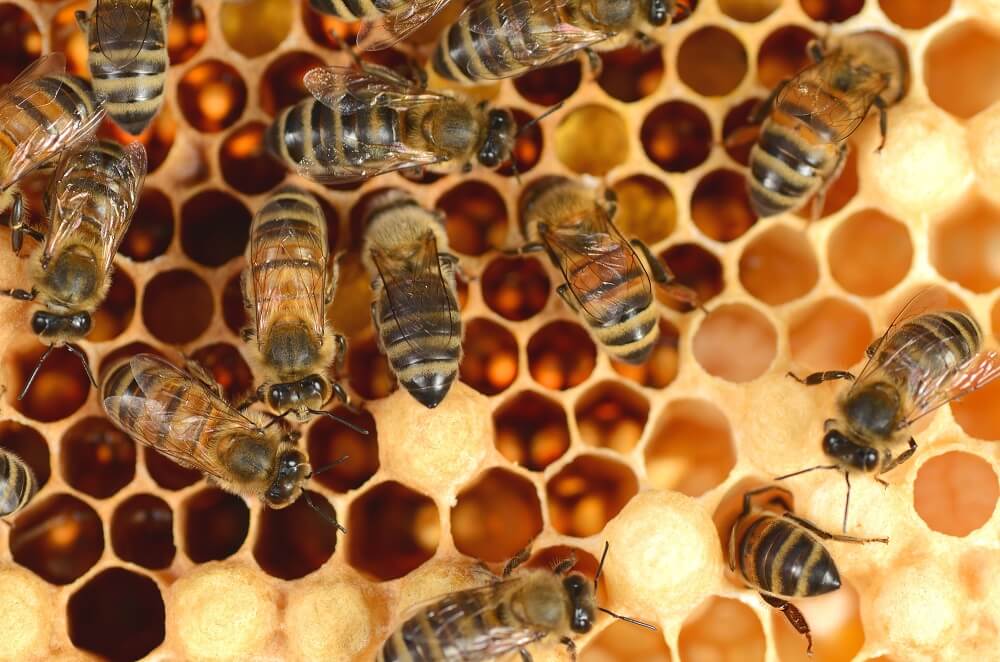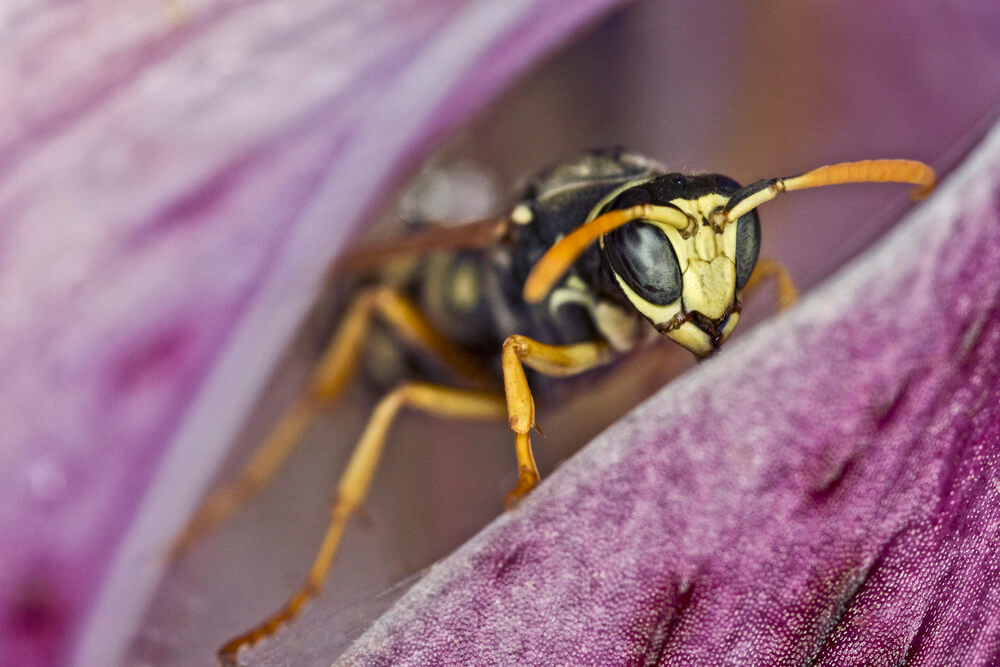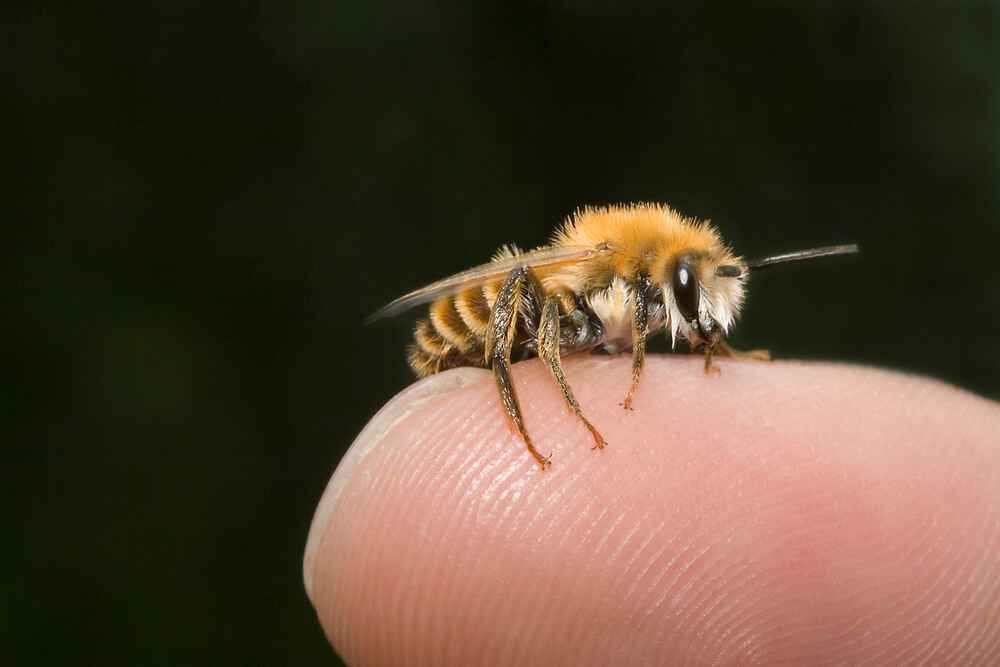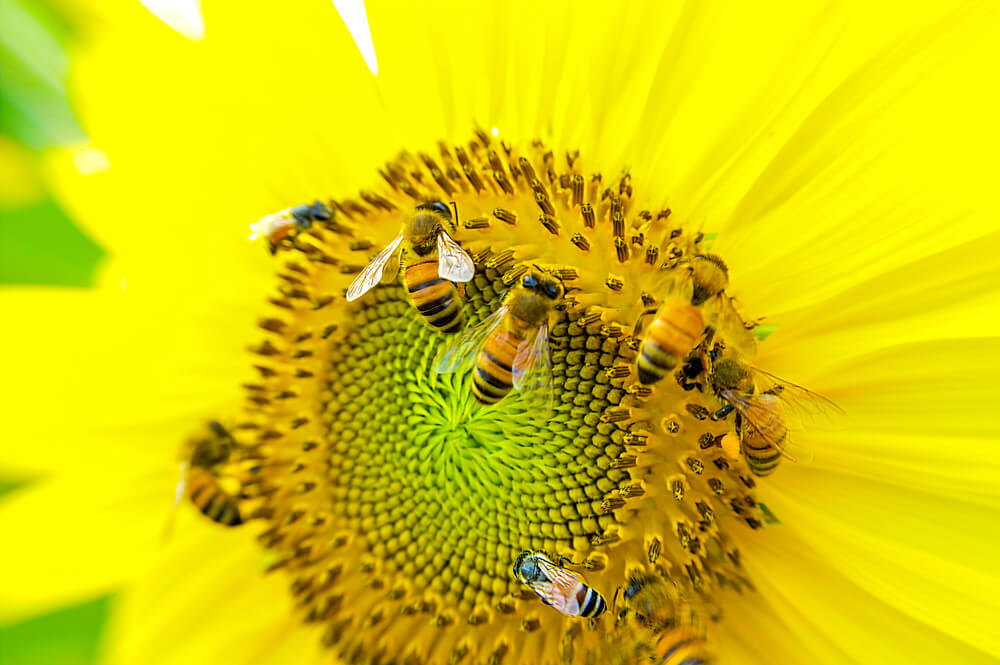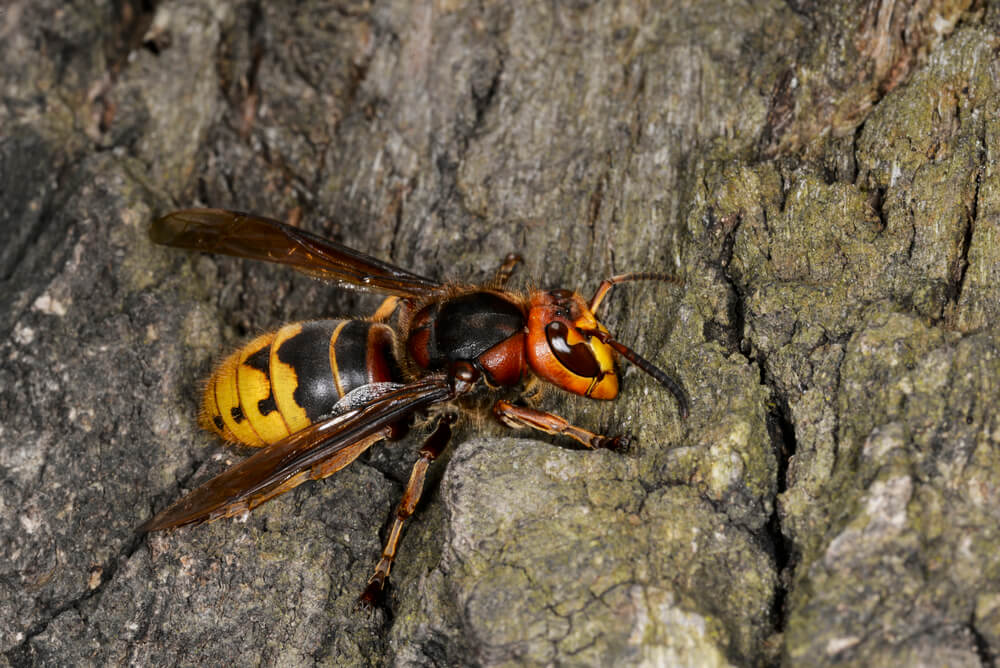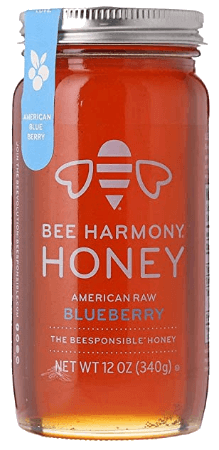Table of Contents:
Do Bees Eat Honey?

Yes, some species of bees make and eat their own honey.
But with that in mind:
Most bees’ main diet consists of pollen and nectar from flowers. Pollen is their protein source, and nectar is their carbohydrate source. But certain bees, like honeybees, supplement their diet with honey when nectar sources are low.
Nectar sources become low during periods of extreme heat or cold. For example, flowers begin to wilt during hot summers with little rainfall. This is known as a ‘nectar dearth.’
And this is where honey comes in.
Take honeybees as an example. They can make up to 100 pounds of honey per year. Their honey comes in various flavors depending on which flowers they pollinate. For example, honeybees that pollinate blueberry blossoms will have blueberry flavored honey.
And it’s delicious.
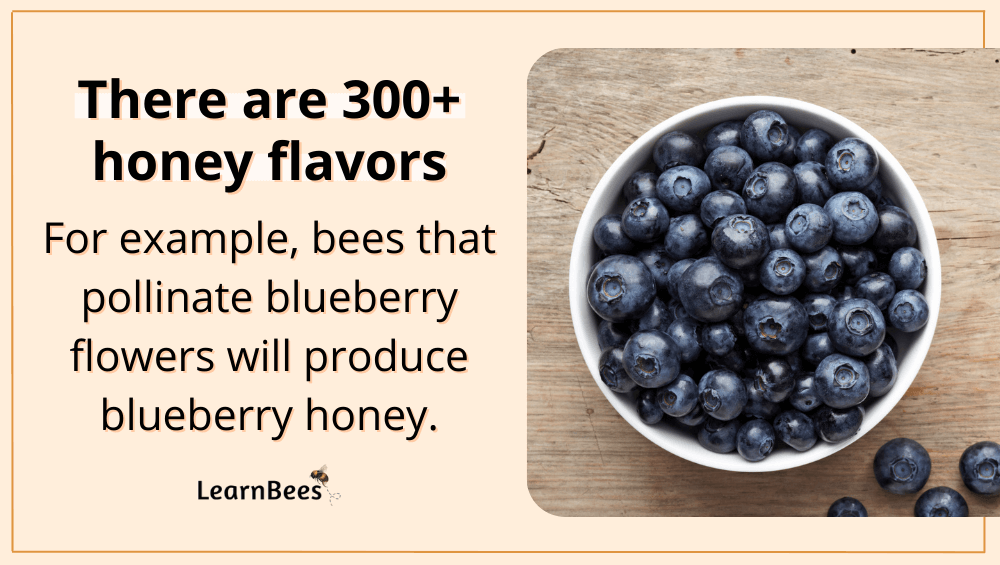
On the other hand, bumblebees typically only make a few tablespoons of honey per year. Bumblebees don’t need as much honey storage as honeybees because their colonies are smaller. Bumblebee colonies also don’t survive the winter like honeybee colonies do.
Let me explain.
A healthy honeybee colony can have up to 60,000 bees in it. Honeybees rarely leave the hive during the winter, and they huddle together to stay warm.
But they still need to eat.
So honeybees rely on their honey storage during the winter to prevent them from starving. Thankfully, healthy honeybee colonies usually produce a surplus of honey during the year. This allows beekeepers to harvest some while leaving the rest for the bees.
This also explains why the pure honey you buy from the store comes exclusively from honeybees. They’re simply the only bees that produce enough excess honey for human consumption.
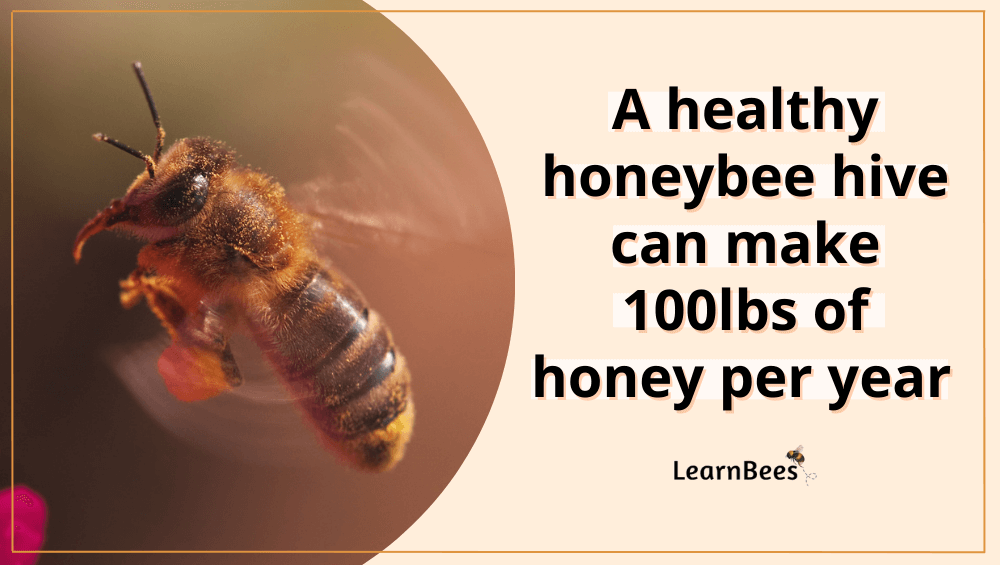
But consider this:
Not all species of bees make or eat honey.
It might surprise you to learn that there are more than 20,000 bee species worldwide. Bumblebees, mason bees, and carpenter bees are just a few common examples.
Here’s the interesting part:
Bees that make honey are social bees that live in groups. These groups are family units called colonies which comprise of
- A queen bee
- Worker bees (females)
- Drone bees (males)
Why is this important?
Because making honey takes lots of effort from many bees. A single bee only produces about 1/12 of a teaspoon of honey in its lifetime. This means that honeybee colonies making 100 pounds of honey per year need thousands of bees to do so.
In contrast, solitary bees that live alone don’t produce honey. They simply don’t have the help from colony members to accomplish this. Mason bees and carpenter bees are two examples of solitary bees.
So, do bees eat honey?
The answer is yes, but it depends on the species.
Speaking of that, the question becomes…
Which Bees Eat Honey?

Spoiler alert:
Most bees actually don’t produce or eat honey. This is because over 90% of bee species are solitary bees that live alone. Female solitary bees build their own nests and fend for themselves. Once their eggs are laid, they provide little or no care for them.(1)
So which bees do make honey?
Here are some common examples:
- Honeybees
- Bumblebees
- Australian Sugarbag Bees
- Melipona Bees
- Vulture bees
Remember:
There are over 20,000 bee species globally. Every species hasn’t been studied as thoroughly as honeybees and bumblebees. This explains why we have tons of data on honeybee honey but have very little on vulture bee honey.
It’s also important to remember that honeybees produce more honey than any other type of bee. We’re talking millions of pounds of honey per year if you add all the honeybee colonies together.
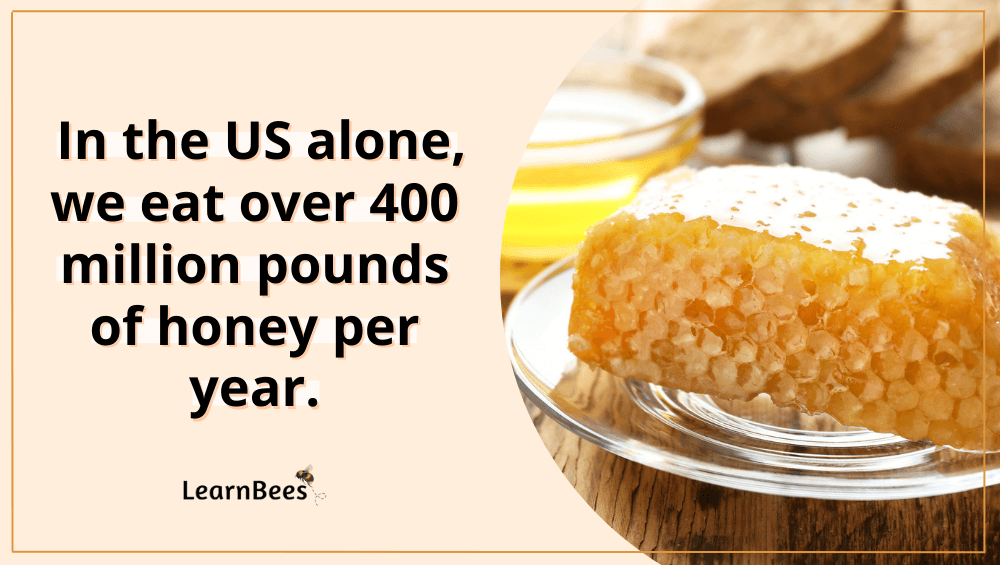
In a nutshell?
Nearly all of the honey we consume comes from honeybees. We eat over 400 million pounds of honey in the US alone. In fact, honeybees live and produce honey in every single state.(2)
Makes sense why they’re called honeybees, right?
And believe it or not:
The top two honey-producing states are North Dakota and South Dakota.(3)
This is surprising to many, considering temperatures in these states can dip below 0°F (-17°C). The bees will die if they get too cold, so many beekeepers wrap their hives with insulation to increase their chances of survival.
But what about warm states?
In places like Florida and California, winters are mild and short, so honeybees can remain active nearly all year long. Flowers bloom throughout the year, and it’s not uncommon to see bees buzzing around in the middle of January.
Can Bees Eat Store-Bought Honey?
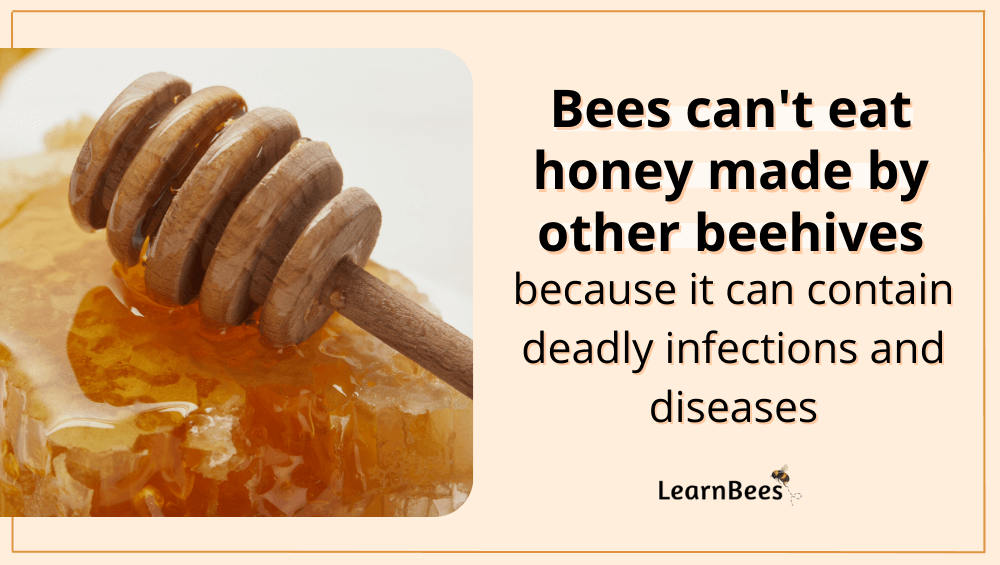
No, bees can’t eat store-bought honey because it can introduce diseases and contamination to their hive. While this might not seem like a big deal at first, such diseases can wipe out entire apiaries.
Here’s the thing:
Certain diseases – like American Foulbrood (AFB) – have no cures. Diseases like AFB are also highly contagious, making them a huge threat to honeybees. Eating honey from other hives is one way that honeybees can contract AFB.(4,5)
Even worse?
Bees infected with AFB must be killed as soon as the disease is detected to prevent spreading to other colonies. This is achieved by burning the hive and beekeeping equipment.
It’s devasting to watch, but it must be done to protect other hives.
So in summary:
Bees should only eat honey from their own hive. Never feed bees honey you buy from the grocery store, even if the label says it’s raw and unfiltered.
FAQs on “Do Bees Eat Honey?”
- Why is honey good for bees to eat?
- Why do bees eat honey?
- Can bees eat raw honey?
- Do bees eat honey in the winter?
- Do bees eat honeycomb?
- Do bumble bees eat honey?
- Do carpenter bees eat honey?
- Do mason bees eat honey?
Why is honey good for bees to eat?
People regularly ask:
Can bees eat honey? Do bees eat honey or just make it? Do bees eat honey or nectar? Do all bees eat honey?
The answer is that some species of bees make and consume their own honey. That said, a bee’s main diet consists of pollen and nectar from flowers.
One reason bees eat honey is that it provides them with energy. For example, bees need a lot of energy to forage for food and maintain their hive. Bees are known to travel over three miles in search of flowers. This is a tough job and requires a lot of energy.
Plus, bees work over 10+ hours per day while making multiple trips to and from their hives. They can’t do this on an empty stomach. This is especially important when nectar sources are low because bees may rely on honey storage for survival.
Honey is an excellent source of energy for bees because it contains mostly sugars in the form of carbohydrates.
In a nutshell, this means that bees need proper nutrition.
Carbohydrates (sugars in nectar or honey), amino acids (protein from pollen), lipids (fatty acids, sterols), vitamins, minerals (salts), and water are all necessary for honey bees to be healthy.
In addition, these nutrients must be in the correct ratio for bees to thrive and survive.
—> Go back to the FAQs on “Do Bees Eat Honey?”
More to Explore:
Why do bees eat honey?
As mentioned, bees eat honey to refuel themselves with energy. This commonly occurs when there is a nectar shortage, such as in the harsh winter and summer months.
For instance, worker bees are female bees that make up most of the hive. They’re responsible for various tasks, such as collecting nectar and pollen, making wax, and guarding the hive.
Because of this, worker bees use honey to gain energy. They need to refuel themselves after working hard and long hours. Keep in mind that worker bees don’t take vacation days. They dedicate their entire lives to their colony’s survival.
As such, bees burn a lot of energy during their lifetime. They use pollen, nectar, and honey to refill their energy tanks.
Drones also eat honey. Drones are male bees responsible for mating with queens from other hives. Besides mating, they don’t do much work, but they still need honey for energy and nutrition.
So drones stay inside the hive, eating honey stores and resting. Once it’s time to mate, they leave the hive to find a new queen.
After the mating season is over, any leftover drones usually get evicted from the hive by female worker bees. This is because drones don’t do much work for the hive. So the worker bees eventually kick drones out to prevent them from using up valuable resources such as honey.
—> Go back to the FAQs on “Do Bees Eat Honey?”
More to Explore:
Can bees eat raw honey?
People often ask, “Can bees eat store-bought honey?” or “What happens if you give bees honey?”
Bees can eat the raw honey that is made by their own hive. They cannot eat honey from the grocery store or other beehives.
The biggest threat to feeding bees honey from outside sources is introducing American Foul Brood (AFB). This is a deadly disease that can transfer to colonies quickly and easily.
The honey you’re feeding bees may be infected with AFB spores without you realizing it. Unfortunately, this will most certainly lead to the death of a colony.
So please don’t feed bees honey from jars you’ve purchased from the store or even other beekeepers.
However, if you have honey from your own bees and are certain it’s disease-free, it’s perfectly safe to give it back to them. In fact, they’ll be glad to receive it.
Just be cautious if you have more than one hive around. Other colonies shouldn’t get access to honey from other hives.
—> Go back to the FAQs on “Do Bees Eat Honey?”
More to Explore:
Do bees eat honey in the winter?
Yes, bees consume their honey during the winter. Pollen is important for their diet, but honey is their primary energy source.
But don’t forget:
Not all bees make honey, and not all bees survive the winter.
For example, carpenter bees and mason bees don’t make honey. In contrast, bumblebee colonies make honey, but they don’t survive the winter, so they only eat it during the warmer months.
Honeybees are the best example of bees that eat honey during the winter.
But honeybees only have a limited honey supply, so they must be frugal with their food supplies. This explains why female worker bees will drive out male drone bees from the hive as winter approaches.
Drones exist to mate with new queens from other hives. The drones can become a useless drain on resources since mating is their only job responsibility. After the mating season is finished, the drones get booted from the hive by the female worker bees.
So when people ask, “Do bees need their honey?” The answer is yes. Honeybees require honey as a source of energy to generate body heat and stay alive during cold months.
—> Go back to the FAQs on “Do Bees Eat Honey?”
More to Explore:
Do bees eat honeycomb?
No, bees don’t eat honeycomb. Honeycomb is made of beeswax and bees only use it to build their homes.
—> Go back to the FAQs on “Do Bees Eat Honey?”
More to Explore:
- Why Do Vulture Bees Eat Rotting Flesh?
- How Long Do Bumble Bees Live?
- Honeybees vs. Bumblebees: How Do They Compare?
Do bumble bees eat honey?
Yes. Like honeybees, bumblebees are social creatures that make honey. But unlike honeybees, bumblebees only make small amounts of honey because their colonies are much smaller.
Bumblebees will store their honey in the nest to feed their young and themselves during nectar dearth.
—> Go back to the FAQs on “Do Bees Eat Honey?”
More to Explore:
Do carpenter bees eat honey?
No, carpenter bees neither make nor produce honey. Carpenter bees are solitary creatures that don’t live in colonies like honeybees and bumblebees. Their diet consists of pollen and nectar from flowers.
—> Go back to the FAQs on “Do Bees Eat Honey?”
More to Explore:
Do mason bees eat honey?
No, mason bees don’t make or eat honey. Like carpenter bees, mason bees are solitary creatures that don’t form colonies. Their diet consists of pollen and nectar from flowers.
